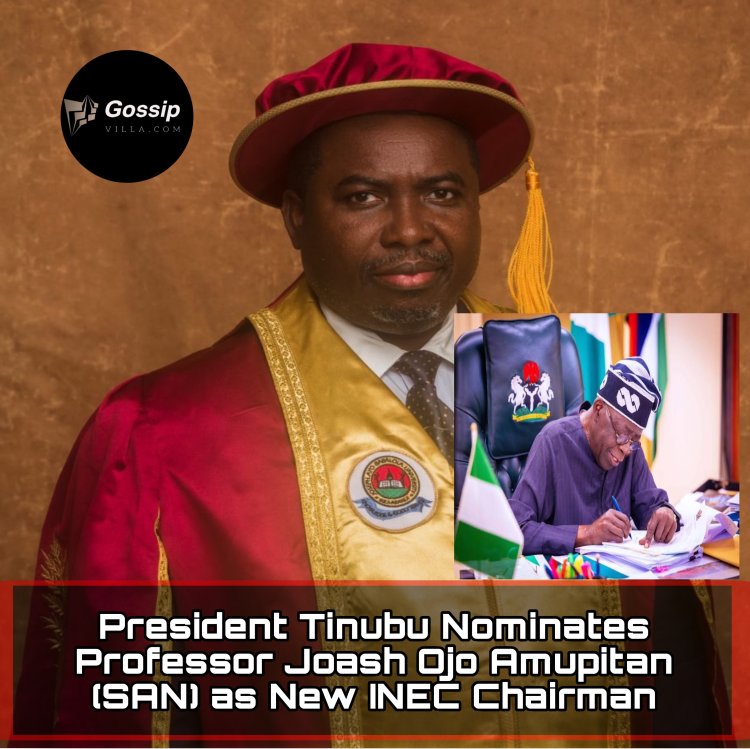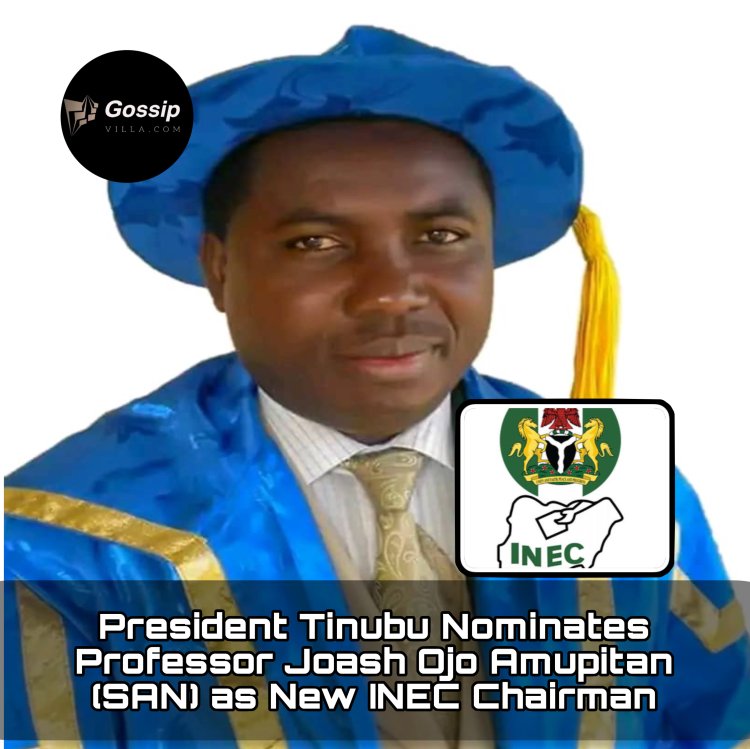President Tinubu Nominates Professor Joash Ojo Amupitan (SAN) as New INEC Chairman
President Bola Tinubu has appointed Professor Joash Ojo Amupitan (SAN) as the new Chairman of Nigeria’s Independent National Electoral Commission (INEC).

President Tinubu Nominates Professor Joash Ojo Amupitan (SAN) as New INEC Chairman
In a key move for Nigeria’s electoral system, President Bola Ahmed Tinubu has nominated Professor Joash Ojo Amupitan (SAN) as the new Chairman of the Independent National Electoral Commission (INEC). The National Council of State has unanimously approved the nomination, and it now awaits Senate confirmation as required by the Nigerian Constitution.
Why the Change?
The INEC chairmanship became vacant after Professor Mahmood Yakubu completed his second and final term in October 2025. May Agbamuche-Mbu, the most senior National Commissioner, has been acting as interim chairman until a permanent replacement is confirmed. With elections like the Anambra governorship and FCT area council polls approaching, appointing a new chairman is a priority.
The Independent National Electoral Commission plays a pivotal role in Nigeria’s democracy, overseeing voter registration, election conduct, and result collation. Recent years have seen INEC face challenges like logistical delays, allegations of bias, and issues with technology adoption, such as the Bimodal Voter Accreditation System (BVAS). Amupitan’s nomination comes at a time when Nigerians are calling for stronger electoral processes to ensure free and fair polls.

Who Is Professor Joash Ojo Amupitan?
Background and Education
• Born: April 25, 1967, in Ayetoro Gbede, Ijumu LGA, Kogi State.
• Education: Attended Kwara State Polytechnic (1982–1984), earned an LL.B from the University of Jos (1987), called to the Bar in 1988, and obtained an LL.M (1993) and Ph.D. (2007) from the University of Jos.
Career Highlights
• Began his academic career in 1989 at the University of Jos (UNIJOS).
• Served as Dean of the Faculty of Law (2008–2014), Head of Public Law (2006–2008), and Chairman of the Committee of Deans and Directors (2012–2014).
• Currently Deputy Vice-Chancellor (Administration) at UNIJOS and Pro-Chancellor of Joseph Ayo Babalola University, Osun State.
• Became a Senior Advocate of Nigeria (SAN) in 2014.
• Authored several legal textbooks, including Corporate Governance: Models and Principles(2008), Evidence Law: Theory and Practice in Nigeria (2013), Principles of Company Law(2013), and Introduction to the Law of Trust in Nigeria (2014).
As a Senior Advocate, Amupitan has shaped legal practice through high-profile cases, particularly in public and electoral law, earning respect for his analytical rigor. His textbooks are widely used in Nigerian universities, influencing legal education and fostering a new generation of lawyers equipped to handle complex electoral disputes.
Significance of the Nomination
A Historic Appointment
President Tinubu noted that this is the first time a Kogi State native has been nominated for INEC Chairman. Kogi State Governor Ahmed Usman Ododo praised Amupitan as “a man of integrity,” while the federal government highlighted the nomination as a sign of Tinubu’s focus on merit and inclusivity.
This appointment reflects a broader push for regional balance in national leadership roles. Kogi State, often overshadowed by larger states, gains prominence through Amupitan’s nomination, potentially fostering greater trust in INEC among underrepresented regions. His legal expertise could also drive policies to strengthen electoral accountability and transparency.
Challenges Ahead
Amupitan’s nomination requires Senate approval before he can assume office. If confirmed, he will lead INEC during a critical period, with upcoming elections and ongoing calls for electoral reforms. His ability to maintain impartiality and strengthen public trust in INEC will be closely watched.
What to Expect
1. Senate Confirmation
The Senate will review Amupitan’s nomination to ensure transparency and due diligence.
2. Key Elections
Amupitan’s early tasks may include overseeing the Anambra governorship election (November 8, 2025) and the FCT Area Council election (early 2026).
3. Electoral Reforms
Stakeholders expect improvements in voter registration, logistics, dispute resolution, and overall electoral integrity.
4. Public Trust
Amupitan’s leadership will need to demonstrate neutrality and fairness to build confidence in Nigeria’s electoral process.
Civil society groups have urged INEC to address voter intimidation, improve access for rural voters, and enhance communication with the public. Amupitan’s experience in public law could help streamline dispute resolution mechanisms, ensuring faster resolution of electoral conflicts. His tenure will also likely focus on leveraging technology to improve result transmission and voter verification processes.
Conclusion
The nomination of Professor Joash Ojo Amupitan (SAN) as INEC Chairman is a pivotal moment for Nigeria’s democracy. With his extensive academic and legal expertise, Amupitan is poised to lead INEC through a crucial phase. If confirmed, his tenure could shape the future of Nigeria’s elections, with the public and stakeholders expecting transparency, credibility, and reform. By addressing longstanding challenges and fostering inclusivity, Amupitan has the chance to strengthen Nigeria’s democratic framework for years to come.
Sources:
What's Your Reaction?




















